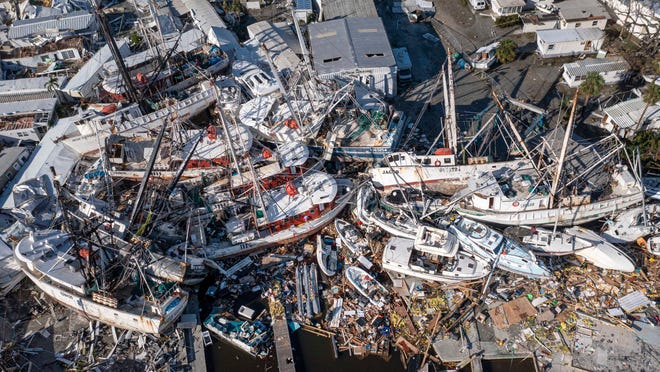EVERGLADES CITY, Fla. – On the door frame of Petra Gengenbach’s 1960s-era supermarket Right Choice, “Irma 2017” is scrawled next to a black line. Not far below it, she pointed to the latest waterline left days earlier.
Gengenbach, 55, spent Friday clearing mud and ruined food from her store after Hurricane Ian’s storm surge swept through the hardscrabble crab fishing community, the last town before Florida’s southwest coast dissolves into the Everglades and mangrove islands.
Though Ian didn’t cause the catastrophic damage seen farther north, the surge of seawater tore through the first floors of homes, sparked a fire at a two-generation airboat business and sent neighbors scrambling to rescue one another in johnboats that sped atop a city turned into a lake.
THERE ARE ‘NO EASY FIXES’ IN FLORIDA:But could Hurricane Ian’s havoc bring a call for better planning?
Gengenbach and others said Everglades City hasn’t gotten a lot of attention – but that didn’t surprise many in this small but resilient community that has weathered everything from a decades-old reputation for smuggling to a history of devastating strikes by hurricanes.
“They never talk about Everglades,” Gengenbach said, comparing the public and media focus after weather events with the attention given to the town’s larger, ritzier neighbors to the north.
On Friday, after the water had receded from roads but with the power still out, it was mostly friends and family helping one another clean mud and haul belongings to the curb in the stifling heat. Many neighbors and families have known one another for generations.
Betty Valdes, 41, who grew up in Everglades City and whose family runs a fishing boat, said that at the height of the surge, people could boat down most every street in town.
“It was solid water,” she said.
Most of Everglades City’s crab boats survived, secured by those who depend on them for their livelihoods.
“We don’t leave. We’re fishermen,” said Yaneris Collins, 49, who cleaned the mud from her yard and lamented that she was still fighting for an insurance claim from Hurricane Irma in 2017.
Rick Collins, 72, a longtime fisherman, said the storm ultimately could be good for crabbing by stirring up the sea floor. But it was a storm he didn’t expect to see so soon.
“When Hurricane Irma came through, my youngest grandson was 11. I told him that when Hurricane Donna came through, I was 11, so maybe it would be 70 more years before we had another one,” he said. “But obviously not.”
Donna hit Everglades City in 1960 with 150 mph winds, causing devastation that helped move the Collier County seat from Everglades City to East Naples. But that was just one of the challenges the city would face over the decades.
‘THE MOST IMPORTANT THING IS WE’RE SAFE’:Floridians escape Ian at casino on edge of Everglades. They found refuge – and slot machines.
In the early 1980s, a series of drug raids dubbed Operation Everglades sent dozens of residents to prison and resulted in the seizure of half the town’s fishing fleet, according to the Naples Daily News.
A decade later, a ban on catching mullet in large nets stymied the commercial fishing economy in the town.
And here were more hurricanes: In 1992, Andrew. Wilma in 2005. Irma in 2017.
Today, Everglades City draws tourists for its proximity to the 10,000 Islands and waterside restaurants that serve local stone crab and grouper. Despite the appearance of more upscale homes in recent years, it remains a tight-knit fishing town.
Residents said Ian’s surge came higher and faster than expected. Collins and his dog had to escape through the window, said Yaneris Collins, his daughter-in-law, who lives upstairs.
It also surprised staff at a waterside restaurant where manager Donna Vanleeuwen and others were cleaning and throwing out food and equipment on Friday. Nearby, a fishing boat lay underwater, probably sunk by the hurricane.
‘THIS IS OUR LIFE. THIS IS US.’:How our Florida journalists are covering Ian while living it
“After Irma, it took a week before they got people down here helping us,” Vanleeuwen said.
Nearby, Todd Johnson, 58, stood near the charred remains of a building. He said the rising water and electricity somehow sparked a fire at the airboat company started by his father after he quit fishing. It also burned down a house he grew up in. Meantime, the surge damaged some of his boats.
He said insurance claims and rebuilding probably would be a struggle. But, like others here, he was accustomed to it.
“We know the routine,” he said. “All too well.”
Chris Kenning is a national news writer. Reach him at ckenning@usatoday.com and on Twitter @chris_kenning.




